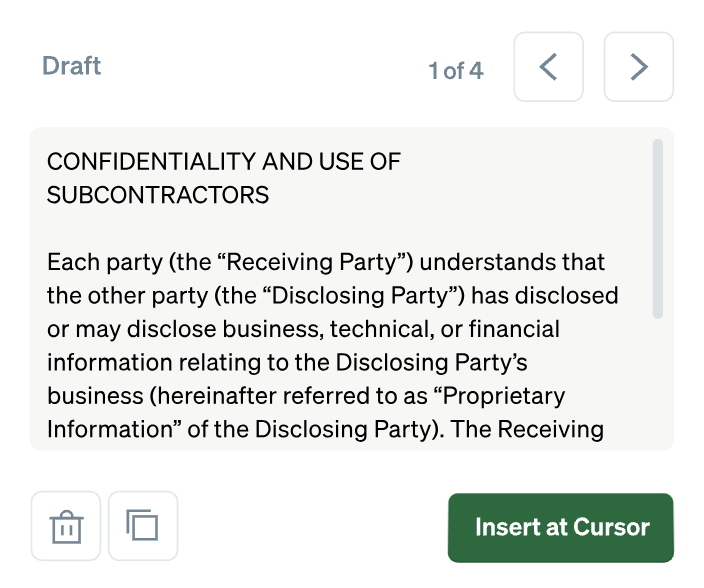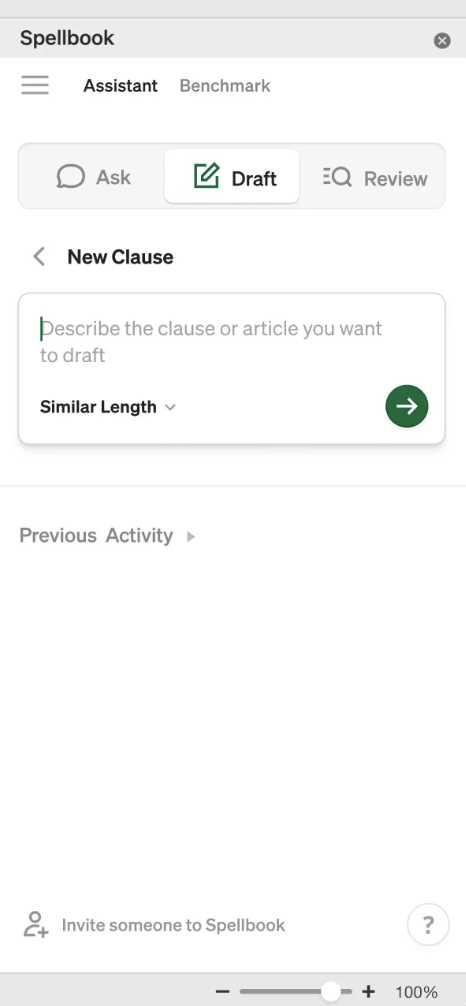
Top 3 Practical AI Use Cases for In-House Law Teams in 2025

It’s 7 p.m., and you’re still at your desk working on multiple contracts. Many lawyers experience this scenario and want a solution to avoid it.
With the rise of AI, legal professionals can use new tools to streamline legal workflows. For example, research shows that AI can reduce the hours professionals spend reviewing documents by up to 40%. AI has the potential to free you for high-value legal work that actually moves the needle. This isn’t merely a trend; more than 85% of Fortune 500 companies and fast-growing startups already use AI to stay ahead. Here’s how:
3 Practical AI Use Cases for In-House Legal Teams
Think about the most time-consuming parts of your job. AI helps in-house legal teams reduce the time spent on legal tasks. Here’s how to use AI for in-house law teams efficiently:
Improving Efficiency
Wordy legal documents can be time-consuming, but reviewing them shouldn’t take up all your time.
Consider a typical contract negotiation. Before AI, you’d spend several hours reviewing clauses, checking precedents, and marking up risks.
Now, AI assists in-house legal teams by instantly assessing risks, recommending language improvements, benchmarking terms against industry standards, and automating the redlining process.
This frees up a significant amount of your time. You’d rather be advising clients, crafting legal strategies, or negotiating deals than reviewing a lengthy document, right?
Dealing with Administrative Tasks
You might spend 50% of your time on tedious tasks, such as document management, compliance tracking, and data entry. These tasks can quickly consume entire workdays, pulling focus from higher-value legal work.
However, using AI to automate tasks can lead to a 20% reduction in time spent on routine tasks. For example, AI can automatically flag compliance-related clauses during contract review and suggest revisions based on legal standards.
AI is here to help lighten the workload, allowing in-house lawyers to prioritize high-value legal work instead.
Simplifying Legal Concepts
One of the biggest challenges for in-house legal teams is translating legal documents into clear, actionable insights for executives and other departments.
Say your procurement team needs to review a 120-page vendor agreement. They don’t need to review every legal detail, only the relevant information.
AI tools like Spellbook can generate an executive-friendly summary in minutes that highlights critical information such as key risks, obligations, and renewal terms. No need to spend half a day summarizing and simplifying legal concepts for business teams when AI can do it more efficiently.
Benefits of Using AI for In-House Legal Teams
Everyone deserves an assistant who reduces the time spent on repetitive tasks and allows them to focus on meaningful duties, such as building arguments. AI for legal work does just that.
Consider the following benefits of using AI:
- Enhanced Document Accuracy – AI flags inconsistent clauses, missing terms, and compliance risks before they become costly issues.
- Faster Task Completion – AI speeds up contract review, drafting, and research.
- Better Compliance Tracking – AI highlights compliance risks and ensures contracts align with applicable laws, internal policies, industry regulations, and client-specific standards.
- Reduced Time on Repetitive Tasks – AI automates redlining, summarizes agreements, and benchmarks contract terms against industry standards or similar agreements to identify risks and suggest improvements.
- Optimized Costs – AI enables legal teams to complete more tasks in less time, resulting in cost savings.
Examples of AI in Legal Technology
Drafting agreements, reviewing contracts, catching errors, and ensuring compliance can consume hours of your day. But what if you could cut that time in half? Here’s how in-house teams are using AI to do so:
Drafting Contracts Using AI
Advanced AI tools, such as Spellbook, can automate the creation of your first draft and suggest revisions, additions, preferred terms, and more, based on best legal practices and company policies.
No need to figure out the ideal wording for a contract on your own. Simply use Spellbook’s clause library or your existing precedents to draft precise documents quickly.

Over 3,000 law firms and in-house legal teams worldwide trust Spellbook’s ability to streamline contract work and reduce legal drudgery. Try our powerful AI contract drafting tool and see the difference for yourself.
Document Review
AI helps you spot the most critical information in legal documents without sifting through mountains of dense text. It can also flag language errors and inconsistencies.
An ILTA study specifically found that law firms using AI for document review experienced an average reduction of 32% in billable hours. This resulted in faster turnaround times, improved accuracy, and increased capacity to focus on high-value legal work.
Contract Review
AI tools like Spellbook can review contracts in seconds. Even better, it seamlessly integrates into Microsoft Word. No need to toggle between multiple tools, making it ideal for employees who are less tech-savvy.

Imagine it’s early morning, and you need to review a 50-page contract. When you open Word, every critical detail is already highlighted for you. All you have to do is click and review.
Automation
AI is the best legal assistant for automating tedious legal tasks and processes. Automation ensures that in-house legal teams are free from time-consuming tasks, allowing them to assist lawyers, such as patent attorneys, with other important matters.
When your law firm adopts an AI tool like Spellbook, you can:
- Use AI to save hours when drafting legal documents.
- Review contracts faster with AI analyzing every clause for you.
- Validate compliance confidently, knowing AI flags missing details.
- Enhance risk management by leveraging AI to identify inconsistencies and ambiguous language.
- Accelerate legal decisions by using AI to evaluate key information quickly.
CunninghamLegal has successfully integrated the AI tool Spellbook into its legal workflows. Lawyers save up to 2 hours daily, cutting down time-consuming tasks, such as drafting and reviewing estate planning documents.
“I like to use Spellbook’s drafting tool. It saves me probably 15-20 minutes searching for an appropriate clause.”
Diego Alvarez-Miranda (Estate Planning Lawyer at CunninghamLegal)
Spellbook significantly cuts the time Diego spends on drafting, especially beneficial if you have a lot of client meetings to attend.
Future-Proof Your Legal Department With Spellbook
AI sounds like a “nice-to-have” tool, but in reality, it’s a “must-have.” If your team is still stuck investing infinite billable hours in redlining agreements and manually locating key clauses, Spellbook is a comprehensive AI tool that can help you:
- Automate contract drafting in seconds.
- Highlight risky clauses and errors in legal documents.
- Compare contracts to best practices and similar agreements, all in Microsoft Word.
Today, in-house legal teams at companies like Nestlé, Fender, and Crocs utilize AI to streamline contract management, mitigate risk, and concentrate on higher-value legal tasks. The question isn’t if AI will become standard in legal departments—it’s when.
If you’re willing to give AI a shot, contact Spellbook today for a free 7-day trial.
Key Takeaways
- AI is a must-have tool for in-house legal teams looking to improve efficiency.
- You can automate legal admin tasks to save half of your time doing repetitive work.
- Many Fortune 500 companies already use AI for in-house law teams.
Frequently Asked Questions
How Does AI Influence the Role of In-House Lawyers?
AI frees you from repetitive tasks, such as contract review and legal research, allowing you to focus more on strategic and complex issues.
Can AI Help In-House Teams with Risk Management?
Yes. AI flags compliance risks and language inconsistencies in contracts to help avoid litigation by addressing issues before they become a problem.
Will AI Replace In-House Lawyers?
No. AI will not replace in-house lawyers. It will transform their work. AI automates contract review, flags compliance risks, and streamlines research. It lacks a lawyer’s critical judgment, strategic thinking, and negotiation skills.
AI enhances efficiency by handling repetitive tasks, allowing lawyers to focus on advising executives, managing disputes, and shaping business strategy. Tools like Spellbook redline contracts and flag risks in minutes, but human expertise remains essential for final decisions.
Thank you for your interest! Our team will reach out to further understand your use case.






